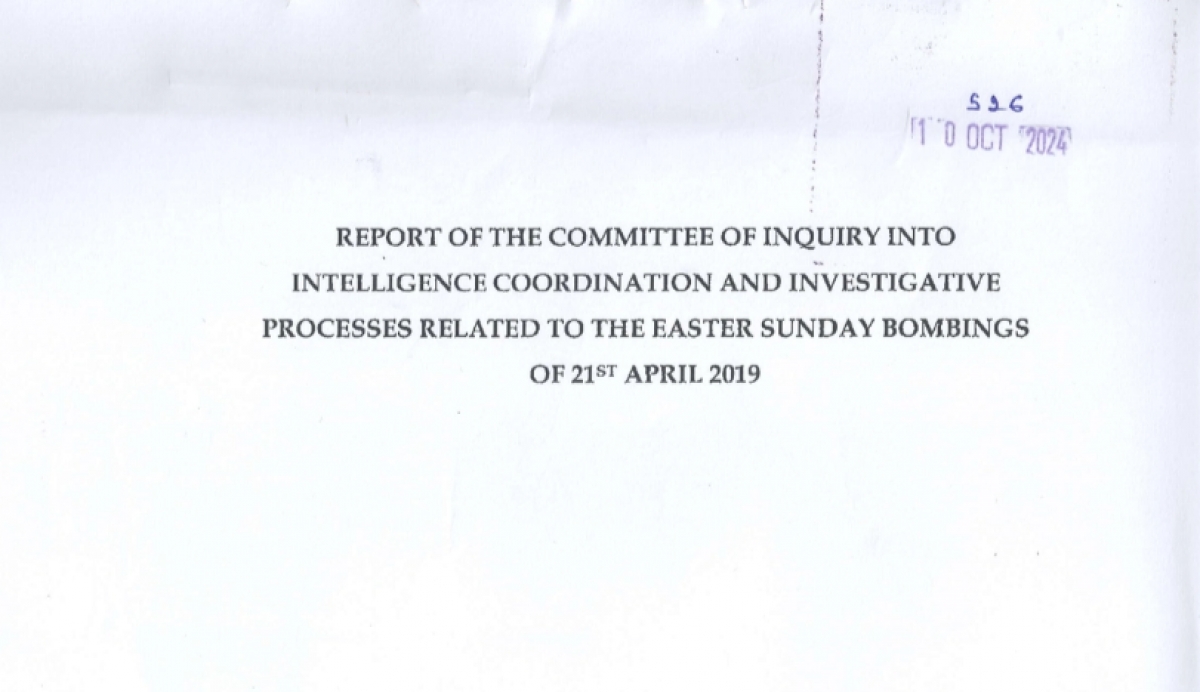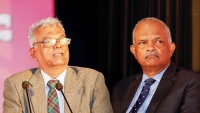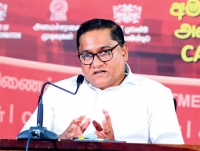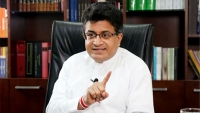- Criminal charges should be filed against Ravi Seveviratne and Shani Abeysekara
- Maithripala Sirisena was exonerated
- Allegations against Ranil Wickremesinghe and Suresh Sallay hasn’t discussed
The report of the committee headed by retired High Court Judge A.N.J. de Alwis on Easter Sunday terror attacks in 2019, was published by former MP Udaya Gammanpila today (21).
The report, prepared by a committee led by retired High Court Judge A. N. J. de Alwis, retired SLAS officer K. N. K. Somaratne, and attorney-at-law W. M. A. N. Nishane, was submitted on 14 September 2024, following an investigation into the failures of the Police, the State Intelligence Service (SIS), the Directorate of Military Intelligence (DMI) and the Criminal Investigations Department (CID).
The committee was appointed by former President Ranil Wickremesinghe on 12 June 2024.
Key officials named in the report
The report specifically names retired SDIG Ravi Seneviratne who is the current Public Security Ministry Secretary and then CID Chief and Shani Abeysekara, then CID Director, for their negligence in handling intelligence related to the attacks. The report says that despite receiving critical warnings, the CID did not undertake comprehensive investigations, nor did it implement adequate preventive measures. The committee calls for criminal charges against both officials under the Penal Code.
The investigation also identified Nilantha Jayawardena, former Director of the State Intelligence Service (SIS), as a key figure whose actions were deemed inadequate. Although he disseminated intelligence to law enforcement and other relevant bodies, the committee found that his efforts to ensure a coordinated and effective response were insufficient. The report recommends that Jayawardena face legal action for failing to act decisively to prevent the attacks.
Sisira Mendis, retired DIG and former Chief of National Intelligence (CNI), was criticized for failing to coordinate effectively between intelligence agencies. The committee found that Mendis did not take necessary steps to follow up on the intelligence, nor did he ensure a cohesive strategy was in place. The report advises criminal prosecution for his role in the breakdown of intelligence coordination.
The report also scrutinizes the conduct of Hemasiri Fernando, former Secretary of Defence Ministry, for not acting promptly on the intelligence. Despite receiving credible warnings, Fernando failed to facilitate a National Security Council (NSC) meeting or take other proactive measures to mitigate the threat. His lack of a timely response, according to the report, played a significant role in the intelligence failure. Criminal charges are recommended against him for his negligence.
The report holds Pujith Jayasundara, former Inspector General of Police (IGP), accountable for his insufficient response to the intelligence. Despite being informed of the possibility of an attack, his actions were limited to delegating tasks to a special team, without personally ensuring a thorough follow-up. The committee found that his reliance on subordinates, amid a strained relationship with then-President Maithripala Sirisena, compromised his duty to act in the public interest. The report recommends that Jayasundara face prosecution under the Penal Code for his failure to adequately address the threat.
Suspended IGP Deshabandu Tennakoon, who was then DIG – Colombo North is also named in the report. The report recommended criminal prosecution and disciplinary action against him, echoing the findings of the Presidential Commission of Inquiry (PCoI), for his role in the failures to act on the intelligence regarding the Easter Sunday attacks.
Sirisena, Wickremesinghe and Sallay
Interestingly, the report exonerated former President Maithripala Sirisena from allegations that he was aware of the intelligence, despite a Supreme Court ruling that ordered him to pay compensation of Rs 100 million for failing to prevent the attacks. The committee's findings contradict other inquiries that suggested Sirisena had been informed but did not take effective action to protect the public. While no criminal action was recommended against Sirisena, the report noted that lapses within the intelligence apparatus during his tenure were significant factors in the failures.
The report made no specific recommendations regarding then Prime Minister Ranil Wickremesinghe, noting that he was excluded from the Supreme Court case because of his immunity as President at the time. His role, however, was not a focal point in the committee's findings.
Furthermore, the report has not addressed allegations against Suresh Sallay, an officer in the Directorate of Military Intelligence (DMI), who was named in a Channel 4 documentary suggesting he had links to the attackers. The committee did not explore these claims or include Sallay in its recommendations, raising concerns about the thoroughness of the investigation.
Moreover, the report emphasized the need for a legislative framework to govern intelligence operations. It proposed enacting an Intelligence Act to formalize intelligence-sharing procedures and establish clear lines of accountability. The committee also suggested reforms to improve the coordination between intelligence agencies and law enforcement, aiming to prevent similar lapses in the future.













